Books: Prospecting for Sobriety

By Norm R.
As a recovering alcoholic, I attend meetings and try faithfully to work the Steps. Some meetings, however, can be discouraging; then my healing depends on books. Space would not permit naming all the books I find valuable, but some of them are listed at the end of this piece. Some are not AA Conference-approved, but they may rescue the non-theist who wants AA, but feels that AA might not return the feeling. Moreover, they may enhance the understanding of regular members.
Why read beyond the Big Book, 12 and 12, and Daily Reflections? The latter work contains some powerful messages; but many of them contain gratuitous God-talk. Familiarity with the other two is not optional, if we intend to hang with alcoholics at meetings, but I must wade past the religion to get help. For most of us, Alcoholics Anonymous is our first source, but it is not beyond challenge.
My initial perusal of “Bill’s Story” gave me hope. Here was a “bad alcoholic” who had found sobriety through sharing his story and passing forward what he was learning. I could do that! But, my spirits plummeted when I came to the chapter, “We Agnostics”, with its message to hang in there until the alcoholic fog lifted, when I would surely come to believe in “God as we understood Him” – evidently the biblical or Christian God. Unfortunately, I had been there, done that. For years I was active in the religion in which I was raised. Re-baptised as an adult, I had prayed mightily and often to get sober – to little avail. Now, firmly non-theist, I was dismayed by the literature, especially by comments such as Dr. Bob’s patronizing statement (AA, p. 181), “If you think you are an atheist, an agnostic, a skeptic, or have any other form of intellectual pride which keeps you from accepting what is in this book, I feel sorry for you” – this from a man who got sober through sharing with another alcoholic after all his religious notions had let him down!
For over six years, I stayed sober, relying on the stories shared at meetings and in The Grapevine. I wanted to belong without overly upsetting the old guard. However, in not offending the “religious” folk, I did little to reassure any non-theists. Eventually, the mask began to chafe and I began to “come out”: I suggested that God needn’t be a person; I declared categorically that my God did not create me just to trap and burn me; I pointed out that if you hear a minister talking about the hereafter, he’s guessing, but that you can listen with trust to AA members when they tell their stories, because they’ve been there and they know.
There were, unfortunately, too few stories and examples of secular sobriety to sustain me. Feeling isolated and overwhelmed, I abandoned ship at exactly six and a half years, unable to believe in some anthropomorphic deity with a plan for me, and determined to do my own work. Predictably, however, immoderate drinking soon clouded my judgement and my personal growth ground to a halt. Thankfully, enough of the Program remained that when my resentful behaviour re-surfaced, it was familiar and I was afraid. After only three months I knew that safety lay with AA fellowship, that I could not survive alone.
Honesty demanded that I stop pretending. More openly than in the past, I declared that I was a non-theist, though I continued to use the Steps as written, to repeat the Serenity Prayer at the opening of meetings, to read aloud whatever I was handed and to join hands for the Lord’s Prayer at the closing – in order, I said, to be part of the spiritual energy of the group. I tried to practice tolerance, attempted to accept the faith of my friends. And, I began to read even more widely.
Among the more encouraging sources are Buddhist teachings. I find comfort in the lessons of the Dalai Lama and guidance in The 12-Step Buddhist by Darren Littlejohn, a recovering alcoholic-addict with a horrific story. A Buddhist and psychological researcher, Littlejohn provides instruction for those who want extra help with the 12 Steps.
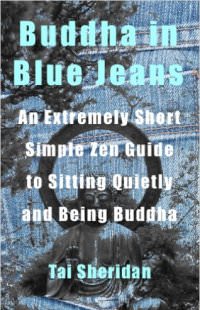 The Buddhist in Blue Jeans, Tai Sheridan, is a Buddhist teacher who uses short blank-verse teachings to simplify life. His e-books are free, but they are invaluable in helping one find peace. His treatment of meditation is positively liberating, it’s so easy. Sheridan’s books are separated into sections containing pertinent short poems which leave me feeling accepting, relaxed, hopeful, clearer about how to deal with emotions. Reflecting on something Tai says is a relaxing and restorative way to end my day.
The Buddhist in Blue Jeans, Tai Sheridan, is a Buddhist teacher who uses short blank-verse teachings to simplify life. His e-books are free, but they are invaluable in helping one find peace. His treatment of meditation is positively liberating, it’s so easy. Sheridan’s books are separated into sections containing pertinent short poems which leave me feeling accepting, relaxed, hopeful, clearer about how to deal with emotions. Reflecting on something Tai says is a relaxing and restorative way to end my day.
One or another of Eckhart Tolle’s books is usually never far from my elbow. Because living in the present is much emphasized (if poorly taught) in AA, I frequently return for guidance to The Power of Now. Tolle’s knowledge of different religions is impressive and Christian readers may feel pleasantly surprised to discover new meaning in Tolle’s explanation of familiar quotations.
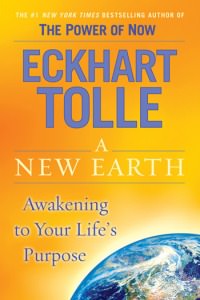 It is in Tolle’s A New Earth: Awakening to Your Life’s Purpose, however, that I find unique help. His discussion of “the pain body”, the many faces of the ego and breaking free are extremely valuable; and Step Two is neatly resolved: “That in you which recognizes madness as madness (even if it is your own) is sanity, is the rising awareness, is the end of insanity.” (p. 154) The Dalai Lama has written (p. 137, Little Book of Wisdom): “The key to transforming our hearts and minds is to have an understanding of the way our thoughts and emotions work.” For that purpose, Tolle is a great help.
It is in Tolle’s A New Earth: Awakening to Your Life’s Purpose, however, that I find unique help. His discussion of “the pain body”, the many faces of the ego and breaking free are extremely valuable; and Step Two is neatly resolved: “That in you which recognizes madness as madness (even if it is your own) is sanity, is the rising awareness, is the end of insanity.” (p. 154) The Dalai Lama has written (p. 137, Little Book of Wisdom): “The key to transforming our hearts and minds is to have an understanding of the way our thoughts and emotions work.” For that purpose, Tolle is a great help.
In reading AA literature in the early years, I had overlooked Bill W’s later work. Alcoholics Anonymous Comes of Age and Language of the Heart ease this non-theist’s approach to AA. Reassured by Bill W. (p 81, AA Comes of Age) that we need not use the exact wording of the Steps, I have gladly followed the lead of writers in The Little Book: A Collection of Alternative 12 Steps (Roger C., ed), and have developed a version of the Steps to which I can ascribe. The very act of writing them has been immensely helpful to my recovery.
The Step Three and Seven Prayers, I reject. The former is maudlin, though it may help the supplicant act better. Might the latter not be harmful? Because solid research finds that prayer does nothing to change anything beyond ourselves, is there not a risk that some supplicants might give up, after begging fruitlessly to become a new person? Bill W does say (Big Book, p. 63) “The wording was, of course, quite optional, so long as we expressed the idea …”, which encourages me to write my own understanding of the task as a hymn to human potential: “With humility and openness, I take action to learn and practice suitable behaviours.” My job.
In place of Daily Reflections, I like Beyond Belief: Agnostic Musings for 12 Step Life, often finding there a secular thought to hold my interest for the entire day. Not all the musings are brilliant; but, at least, they avoid the idea that some exterior agent with a magic wand will do my work for me.
AA suggests, confusingly, that my illness is a consequence of my character defects. Dr. Gabor Maté says not – not the fault of the victim. This is crucially important. Beyond captivating, his experiences among the addicts and alcoholics of Vancouver’s eastside slums (In the Realm of Hungry Ghosts) are gut-wrenching. Maté uses his own story and theirs to illustrate that we are almost always hooked on more than one substance or behaviour, which caused me to re-examine my own behaviour.
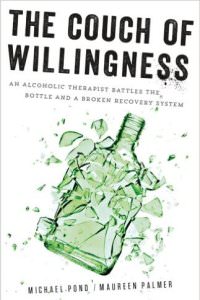 In The Couch of Willingness, Michael Pond, an addictions counsellor, relates the devastating nature of his own addiction and the painful process of recovery. His Vancouver-based story captivates and shocks, as we realize the disparity in ethics and effectiveness among treatment programs. Dr. James Milam, who co-authored Under the Influence, argues persuasively (almost in concert with Dr. Maté) that alcoholism is a neuro-physiological response which happens in a small percentage of those who drink. Though the majority of drinkers do not share the problem, alcoholism is nonetheless not some kind of moral failure: “alcoholics are not morally or psychologically defective people, but innocent victims of a chronic and progressive disease.” We need to remember that.
In The Couch of Willingness, Michael Pond, an addictions counsellor, relates the devastating nature of his own addiction and the painful process of recovery. His Vancouver-based story captivates and shocks, as we realize the disparity in ethics and effectiveness among treatment programs. Dr. James Milam, who co-authored Under the Influence, argues persuasively (almost in concert with Dr. Maté) that alcoholism is a neuro-physiological response which happens in a small percentage of those who drink. Though the majority of drinkers do not share the problem, alcoholism is nonetheless not some kind of moral failure: “alcoholics are not morally or psychologically defective people, but innocent victims of a chronic and progressive disease.” We need to remember that.
To enable AA without God, Archer Voxx wrote his Universal Edition of the Big Book, eliminating religious references. An arduous task, it is a worthwhile addition to non-theistic approaches to the program. It doesn’t work especially well for me, but some will find it useful. Another interesting work by Voxx is The Five Keys: 12 Step Recovery Without a God.
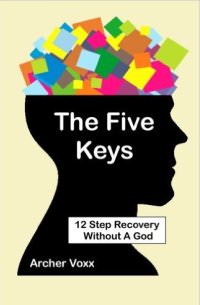 The first key is a historical summary along with an assessment of AA’s place in society. Historians might want to consider, also, Ernest Kurtz’s non-approved, but definitive history of AA, Not-God, and Bob K’s Key Players in AA History. The second key is “Major Program Influences”, which – along with the two works cited above – will remind the reader that AA was not the first nor the only player in the field. Key #3 is “The Spiritual Transformation”, in which Voxx substitutes for religion a “down-to-earth activity”. Useful. Key #4 provides “Universal Spiritual Principles” which Voxx intends to help supplant the need for God or a Higher Power. Key #5 provides Voxx’s re-write of the 12 Steps to eliminate the “God talk”; other good models can be found in The Little Book, previously mentioned.
The first key is a historical summary along with an assessment of AA’s place in society. Historians might want to consider, also, Ernest Kurtz’s non-approved, but definitive history of AA, Not-God, and Bob K’s Key Players in AA History. The second key is “Major Program Influences”, which – along with the two works cited above – will remind the reader that AA was not the first nor the only player in the field. Key #3 is “The Spiritual Transformation”, in which Voxx substitutes for religion a “down-to-earth activity”. Useful. Key #4 provides “Universal Spiritual Principles” which Voxx intends to help supplant the need for God or a Higher Power. Key #5 provides Voxx’s re-write of the 12 Steps to eliminate the “God talk”; other good models can be found in The Little Book, previously mentioned.
I like Adam N’s Common Sense Recovery: An Atheist’s Guide to Alcoholics Anonymous, where I find strong support for AA from a writer who pushes aside the veil of religion to discover and honour the fellowship which gets us and keeps us sober. In the foreword, Ward Ewing, a retired senior churchman and past Chair of the General Service Board (non-alcoholic), provides this cogent assessment:
The power of AA is greater than any individual person; it makes the impossible possible. Many in AA refer to this lifesaving force, this culture, this esprit de corps, this higher power as God. Others who cannot bring themselves to compromise their rational understandings, to believe in some sort of deity, still experience this power within AA groups. I would suggest that the differences between those who wish to call it God and those who have a different understanding of its nature are small in comparison to our shared experience.
And now I leave it to you to decide. Do you want a fresh take on AA? Are new trails to sobriety inviting? I end where the Dalai Lama begins The Little Book of Wisdom:
Although I speak from my experience, I feel that no one has the right to impose his or her beliefs on another person. I will not propose to you that my way is best. The decision is up to you. If you find some point which may be suitable for you, you can carry out experiments for yourself. If you find that it is of no use, then you can discard it.
Treasury of Books
- The Grapevine
- Beyond Belief: Agnostic Musings for 12 Step Life, Joe C
- Do Tell: Stories by Atheists and Agnostics in AA, Roger C (editor)
- The Little Book: A Collection of Alternative 12 Steps, Roger C (editor)
- The Dalai Lama’s Little Book of Wisdom
- The Sermon on the Mount, Emmett Fox
- Key Players in AA History, bob k
- Not-God: A History of Alcoholics Anonymous, Ernest Kurtz
- Tao Te Ching, Lao Tzu
- The 12-Step Buddhist, Darren Littlejohn
- In the Realm of Hungry Ghosts: Close Encounters With Addiction, Dr. Gabor Maté
- Under the Influence: A Guide to the Myths and Realities of Alcoholism, James Milam and Katherine Ketcham
- Common Sense Recovery: An Atheist’s Guide to Alcoholics Anonymous, Adam N
- The Age of Reason, Thomas Paine
- The Couch of Willingness (An Alcoholic Therapist Battles the Bottle and a Broken Recovery System), Michael Pond and Maureen Palmer
- Buddha in Blue Jeans, Tai Sheridan
- Relax, You’re Going to Die, Tai Sheridan
- Secrets of True Happiness, Tai Sheridan
- The Light of the Ancient Buddhas, Tai Sheridan
- Zen Prayers for Repairing Your Life, Tai Sheridan
- A New Earth: Awakening to Your Life’s Purpose, Eckhart Tolle
- The Power of Now, Eckhart Tolle
- Stillness Speaks, Eckhart Tolle
- Alcoholics Anonymous: Universal Edition, Archer Voxx
- The Five Keys: 12 Step Recovery Without a God, Archer Voxx

























Thank you for this list and your story, Norm! I also recommend A Principal of Recovery by Jack Grisham. It’s an insightful and slightly edgy explanation of realist recovery.
Thank you, Norm, for a well written and most informative potential chapter in The Practical Book. I thoroughly enjoyed reading it, and have several other books added to my must-eventually-read list!
Another book that was most helpful to me when I got sober in the 1970s was William Madsen’s The American Alcoholic. His chapter, examining Alcoholics Anonymous, “A.A.: Birds of a Feather,” presents AA as effective folk psychotherapy, emphasizing the importance of community that alcoholics find by gathering together to share experience, strength and hope. It provided an early scientific rationale for me to recover using Groups of Drunks and the stories we shared together as my higher power.
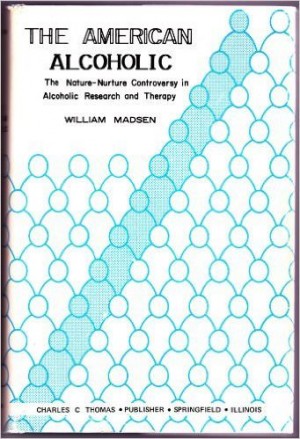
Thanks for this list. I have already read most of these books, but there are a few I wasn’t aware of. I read Beyond Belief each day and I also read a couple of pages of A New Earth or The Power of Now each day.
Thanks for your post, most especially for the Tolle: “That in you which recognizes madness as madness (even if it is your own) is sanity, is the rising awareness, is the end of insanity.”
I can identify!!
Norm, thanks. Would like to add that for us (me and my alanon GF) it has been important to have daily morning readings. The Daily Reflections is of course most often, abhorrent, no less. Published in 1992 I blame it for much of the religious revival within AA since its publication.
But we have found a couple of others: We found Hazelden’s Touchstones to be among the more benign, and read it for a while, though we quickly abandoned it in favor of Beyond Belief which, though it often feels a bit too intellectual for what we need in the morning, is a good solid, non-threatening book.
Our favorite so far, by far, has been Deng Ming Dao: 365 Tao. It seems to me it accomplishes what many of us here at AA Agnostica aspire to with varying degrees of success: Spirituality without religion. His take is something like “Yeah, yeah, there may be gods, but that really isn’t important. What is important is what you do with your life today, so let’s focus on what we can do today”. It has numbers, and a corresponding list of dates in the back for those that want to be anal about reading the proper date, but since we only get around to reading about every other day on an average, this book lasted us about two years.
Now we’re going through Tian Dayton: Forgiving & Moving On. We felt we needed something, and this was the best one we found. It does have some god stuff in it, but much of the time there’s a week in a row without any. I sat down for a couple of hours and edited out all god and higher power stuff with a fat pencil, wasn’t too hard, and only perhaps 10 days of the year were a complete loss. On the other hand, once edited a bit, there are many, many really good readings in there for those of us whose main issues are with forgiving rather than with making amends for the wrongs we have done.

I used to take recovery literature more seriously than I do now. I may enjoy reading a book or article about alcoholism, but this matters little to me concerning not drinking and trying to stay on an even keel emotionally. For me, the most important thing is the realization that drinking would probably ruin everything. I do go to AA meetings, usually at least once a week, and sometimes I find them helpful, but I don’t feel that I really rely on them anymore to stay sober. I rely on myself now, and it seems fine.
Thank you Norm R. for a wonderful article. I was a theist in AA for 20 years. My last sponsor suggested that some of my problems were persistent because my concept of a higher power was an amorphous plasma and not an anthropomorphic deity. (That was our last conversation.)
An AA member loaned me a copy of “The Power of Now” which I devoured. The concepts and practices in it genuinely helped me with a persistent depression. At the suggestion of the book I sought a group to meditate with. This led me to an interest in buddhist meditation and buddhism. I listened to to a lot of Tara Brach. I have become what you might call a “secular buddhist” as well as a non-theist.
Around the time of my conversion some AA members in my hometown developed a resentment towards self righteous AA members, found a coffee pot, and started a We Agnostics meeting. (Am I lucky or what?) We continually see newcomers who are a little freaked out about the religiosity at many meetings. In retrospect I have come to realize that there were always Atheist/Agnostic members throughout my experience in AA.
I make no effort to convert anyone to my way of thinking. I encourage theistically inclined members to practice the program as they find it in the Big Book. (I might offer them a caveat about Chapter 4.) I know the program works for believers. And I don’t want them to suffer from continued drinking. As for believing in a higher power, the notion that someone out there is on your side and rooting for you has to be a comforting and motivating thought. Whether that thing exists or not seems to be irrelevant if the idea is helpful. I think in my case it was.
My first impression of AA was that, on a spectrum of religious organizations, it was wildly liberal. That appealed to me. The only group I can think of that might be to the left of AA is Unitarianism. I really want AA to live up to my initial, and possibly naive, impression. But fundamentalism is a common feature of human nature that seems to grow out of fear. I am amazed how quickly foundational literature can become dogma and inerrant. We certainly know more now about recovery than the first 100 did with their 5 years of sobriety and science’s limited understanding of addiction at that time. Thank god for Jim Burwell. (Irony intended.) Without him, AA would just be some bizarre christian subgroup. I sometimes have to explain to non-AA 12 step groups that their permission to have the god/high power of their understanding was the gift of an avowed and dedicated atheist.
Again, thanks for a great article.
Thanks to all you good folks for your kind comments, and especially for tips to more books … This is like sponsoring: I received more than I gave!